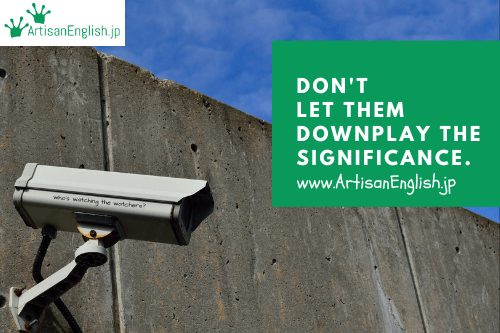
YouTube / iTunes / Spotify / Radio Public / Pocket Casts / Google Podcasts / Breaker / Overcast
Listen to ArtisanEnglish.jp posts & lesson intros here.
Word of the Day: Downplay
As often happens with new technology, we tend to emphasize the benefits and downplay the drawbacks.
What I mean by that is we tend to make things seem less important or harmful than they really are.
Downplay means to make things seem less important or harmful than they really are.
People tend to downplay their weaknesses, for example.
The first thing which comes to mind is nuclear power.
The world entered the atomic age at the end of World War Two.
Humans realized at that time the incredible power which could be used for destruction or to do good.
Wars would no longer be fought because the possible outcome of nuclear war’s complete and utter devastation was too high a risk.
Nuclear power was also said to be the saviour of the world.
Humanity would be able to have endless amounts of clean energy.
Governments and power companies downplayed the concerns about where spent nuclear fuel would be stored or the costs of accidents and shutting down old nuclear power plants.
Now, we know differently.
Chornobyl, Three Mile Island and Fukushima have made us reconsider.
There is new technology on the horizon.
The ability of surveillance cameras to pinpoint trouble or troublemakers very quickly is being put forth as a way to stop or even prevent crime before it happens.
England, more specifically London, is the poster child of video surveillance in Western society.
According to one study, there is possibly one camera in England for every 14 people.
Of course, the invasion of privacy factor is downplayed by police services and governments alike while the benefits are praised.
To get a clearer picture, pardon the pun, we need to look no further than China, which is building a surveillance state.
People there are tracked using facial recognition so that police or the government, secret services, the military, and only God knows who else can monitor individuals 24/7.
Technology is great and can help humanity, but we must not let the downsides be downplayed.
Flesch-Kincaid Readability Test
This post is understandable by someone with at least a 9th-grade education (age 15).
On the Flesch-Kincaid reading-ease test, this post scores 60.
The easier a passage is to read, the higher the score on a scale of 0 – 100.

